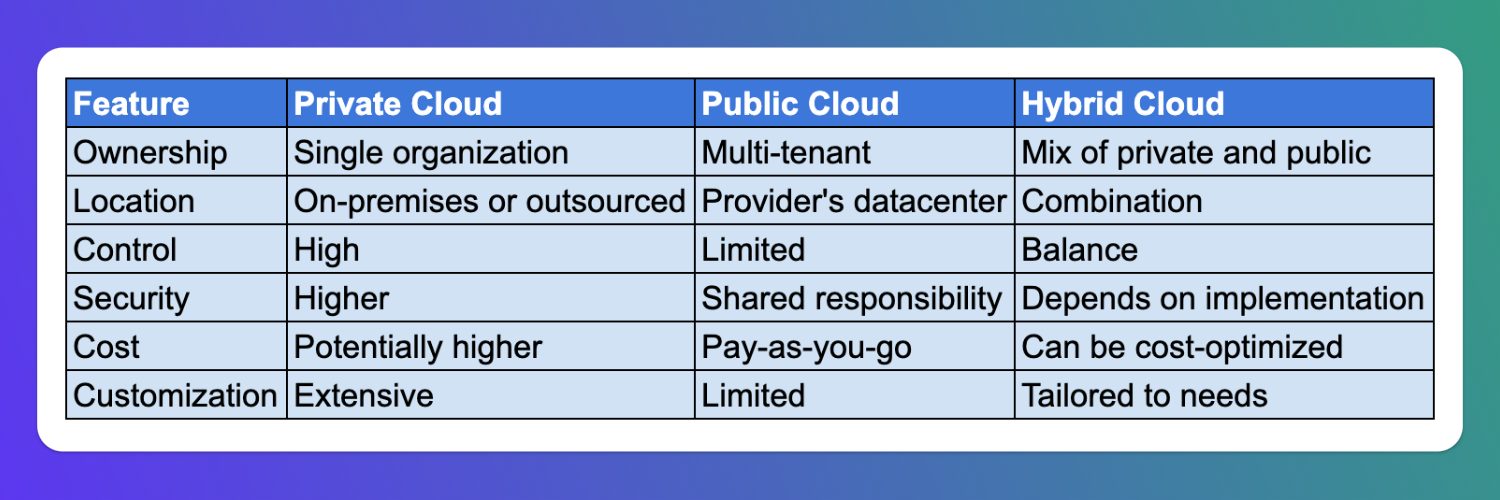Introduction
Cloud computing has undeniably transformed the way organizations approach IT infrastructure. Among the prevalent cloud models, private clouds (internal or corporate clouds) are rapidly gaining traction due to their emphasis on security, control, and customization. This article delves into the fundamentals of private cloud computing, its architectural components, advantages, drawbacks, various types, use cases, and comparisons with other deployment models.
Understanding Private Cloud
Unlike public clouds offering multi-tenant shared infrastructure, a private cloud dedicates cloud computing resources to a single organization. As a single-tenant environment, it affords enhanced isolation, security, and control over the underlying hardware and software stack. Private clouds can reside within the organization’s own data center (on-premises) or may be outsourced to a third-party service provider for hosting or management.
Technical Deep Dive: Private Cloud Architecture
The heart of a private cloud architecture rests upon several critical technologies:
- Virtualization: Hypervisors (e.g., VMware vSphere, Microsoft Hyper-V, KVM) abstract physical hardware, creating pools of virtualized compute, storage, and network resources. This allows dynamic allocation to virtual machines (VMs) or containers.
- Cloud Management Platform (CMP): Platforms like OpenStack, VMware vRealize, or Nutanix offer orchestration, automated provisioning, self-service portals, and policy management to streamline private cloud operations.
- Software-Defined Networking (SDN): Tools like VMware NSX decouple network control from the underlying hardware, allowing for virtual network overlays, security micro-segmentation, and granular traffic management.
- Software-Defined Storage (SDS): SDS solutions abstract storage capabilities and provide features like deduplication, compression, replication, and snapshots, increasing flexibility and reducing management overhead.
Private Cloud vs. Public Cloud vs. Hybrid Cloud

Types of Private Clouds
- On-Premises: Deployed in the organization’s own data center, offering maximum control and customization but requiring in-house IT expertise.
- Virtual Private Cloud (VPC): A logically isolated and secure section within a public cloud infrastructure, providing private cloud benefits within a shared environment.
- Hosted: External providers host the private cloud infrastructure, relieving organizations of some on-site management burdens.
- Managed: Third-party providers assume complete management of the private cloud, streamlining operations for the organization.
Advantages of Private Cloud
- Enhanced Security: Private clouds operate behind corporate firewalls, provide strict access controls, and enable tailored data encryption to better secure sensitive data.
- Regulatory Compliance: Ideal for complying with stringent industry-specific regulations (e.g., HIPAA, PCI DSS) as organizations own their data and infrastructure completely.
- Customization: Full control over hardware selection, software configurations, and resource allocation, ensuring alignment with specific workload requirements.
- Performance: Private clouds offer predictable performance and low latency, particularly for latency-sensitive applications and internal traffic.
Disadvantages of Private Cloud
- Upfront Costs: Significant capital expenditure on hardware, software, and potentially additional support staff.
- Scalability: Available on-premises resources may limit scaling on demand or require substantial upfront infrastructure investments.
- Expertise: In-house management requires specialized cloud skills, which may increase personnel costs.
Use Cases for Private Clouds
- Sensitive Workloads: Storing or processing data subject to strict regulations or classified information.
- Mission-Critical Applications: High-performance, reliability, or availability requirements.
- Legacy Systems: Supporting older systems incompatible with public cloud environments.
- Development & Testing: Secure environments for rapid development and testing
Conclusion
Private clouds offer a potent solution for organizations demanding granular control, heightened security, and customization in their cloud initiatives. Whether motivated by regulatory compliance, the need to handle sensitive data, or the support of highly specialized workloads, private clouds deliver exceptional levels of adaptability.
The future of private clouds looks bright. Advancements in automation, containerization, and hybrid cloud management further amplify the benefits of private clouds.